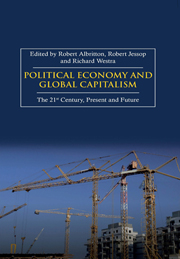Book contents
- Frontmatter
- Contents
- List of Abbreviations
- Notes on Contributors
- Introduction: Political Economy and Global Capitalism
- Part 1 Political Economy of the Present
- Part 2 Political Economy of a Progressive Global Future
- Introduction
- 6 Volatile, Uneven and Combined Capitalism
- 7 The Erosion of Non-Capitalist Institutions and the Reproduction of Capitalism
- 8 The Transformative Moment
- 9 Frontiers of Cadre Radicalization in Contemporary Capitalism
- 10 Green Marxism and the Institutional Structure of a Global Socialist Future
- Index
8 - The Transformative Moment
from Part 2 - Political Economy of a Progressive Global Future
Published online by Cambridge University Press: 05 March 2012
- Frontmatter
- Contents
- List of Abbreviations
- Notes on Contributors
- Introduction: Political Economy and Global Capitalism
- Part 1 Political Economy of the Present
- Part 2 Political Economy of a Progressive Global Future
- Introduction
- 6 Volatile, Uneven and Combined Capitalism
- 7 The Erosion of Non-Capitalist Institutions and the Reproduction of Capitalism
- 8 The Transformative Moment
- 9 Frontiers of Cadre Radicalization in Contemporary Capitalism
- 10 Green Marxism and the Institutional Structure of a Global Socialist Future
- Index
Summary
We are living in one of the most exciting times in history. It is a time of crisis and breakdown, and a time of potential transition to a new and more evolved economic and social stage. Diverse and vibrant movements for social transformation are springing up all around the world. The US, while playing a reactionary role through its imperialist state policies and globalizing corporations, is also a locus of significant post-modern transformation. We call this time in the US ‘the Transformative Moment’, to emphasize its potential for paradigmatic and systematic economic and social change.
The Transformative Moment can be understood as a deep-seated and many-faceted response to the imbalances, inequality and lack of freedom created by the reigning economic and social paradigm, a paradigm that we call the Hierarchical Polarization Paradigm. In the first part of this paper, we will analyse the core elements of the Hierarchical Polarization Paradigm. In the second part, we will discuss the seven transformative processes that various US social movements are participating in now; processes, which are beginning to construct a new, more balanced, free and equal paradigm of economic and social life.
Our goal in this paper is to provide the reader with a new conceptual framework, which will help them understand the transformative potential of the present historical conjuncture in the US – the Transformative Moment. The conceptual framework presented here builds on the fundamentals of Marxian economics, particularly as interpreted by David Levine (1977; 1978; 1981).
- Type
- Chapter
- Information
- Political Economy and Global CapitalismThe 21st Century, Present and Future, pp. 177 - 200Publisher: Anthem PressPrint publication year: 2007



